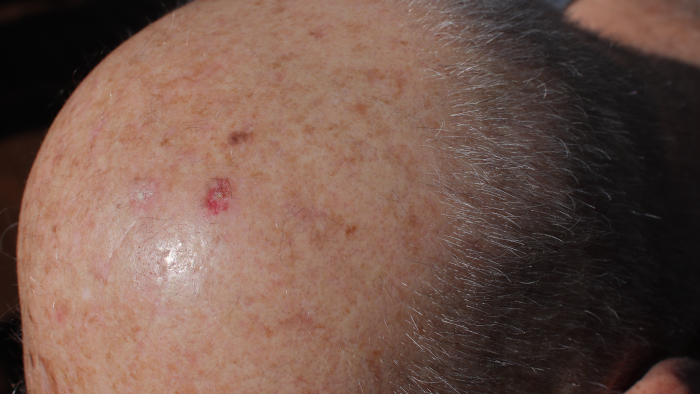Actinic keratoses are commonly found on sun exposed skin. Fortunately, they are easily treated. However, delays in treatment can result in malignant transformation to squamous cell cancer. Such delays are relatively common with the long waits for dermatology appointments. Now, you can say goodbye to the overwhelming frustration and anxiety caused by months-long waiting periods for appointments. The Trillium Clinic is proudly redefining the dermatologic care model, ensuring that every patient will be seen within 14 days of requesting an appointment. Step into a new era of patient-centered care, where the agony of waiting for appointments becomes a thing of the past.
What is an Actinic Keratosis

Actinic keratoses appear as rough, scaly, or crusty patches on sun-exposed areas of the skin, such as the face, scalp, ears, neck, arms, and hands. These patches may range in color from flesh-colored to pink, red, or brown. In some cases, they can be itchy, tender, or even cause a burning sensation.
What causes an Actinic Keratosis
The primary cause of actinic keratosis is cumulative sun exposure over time. Factors that increase the risk of developing AK include:
Fair skin: People with fair or light-colored skin are more prone to developing actinic keratosis.
Frequent sun exposure: Spending significant time outdoors, especially without adequate sun protection, increases the risk.
Age: Actinic keratosis is more common in older individuals, as the skin’s ability to repair itself diminishes with age.
Weakened immune system: People with weakened immune systems, such as those with HIV/AIDS or undergoing organ transplantation, have an increased risk.
How are Actinic Keratoses treated
The primary goal of treating actinic keratoses is to remove the abnormal skin lesions and prevent them from progressing into skin cancer. Treatment options include:
Topical medications: Prescription creams, gels, or solutions containing ingredients like fluorouracil, imiquimod, diclofenac, or ingenol mebutate can be applied to the affected area to promote the shedding of abnormal skin cells.
Cryotherapy: Liquid nitrogen is used to freeze and destroy the abnormal cells. This treatment causes the treated skin to blister and eventually peel off.
Curettage and electrodesiccation: The affected area is numbed, and a dermatologist scrapes off the abnormal tissue using a curette (a sharp instrument). An electric current is then applied to control bleeding and destroy any remaining abnormal cells.
Photodynamic therapy: A topical medication is applied to the skin, which is then exposed to a specific wavelength of light to activate the medication and destroy the abnormal cells.
Laser therapy: High-energy laser beams are used to selectively destroy the abnormal cells.
Excisional surgery: In cases where actinic keratosis shows signs of possible skin cancer, a surgical procedure may be performed to completely remove the affected area.
Can Actinic Keratoses be prevented
To prevent actinic keratosis and reduce the risk of skin cancer, it is important to:
Limit sun exposure: Seek shade, especially during peak sun hours, and wear protective clothing, hats, and sunglasses.
Apply sunscreen: Use a broad-spectrum sunscreen with a high SPF on exposed skin, even on cloudy days.
Avoid tanning beds: Tanning beds emit harmful UV radiation and increase the risk of skin damage and skin cancer.
Embark on your journey
Regular skin examinations and follow-ups with a dermatologist are recommended for individuals with a history of actinic keratosis to monitor for any changes or new lesions. Early detection and treatment is crucial to prevent the evolution of these lesions into a squamous cell cancer.
You should schedule annual skin checks if you are low risk, and more frequent total body skin examinations if you have had extensive sun damage from work or play or if you have a history of actinic keratoses or other skin cancers.
As experts in the detection and treatment of skin cancer, we invite patients from Chapel Hill, Carrboro, Hillsborough, Pittsboro, Mebane, Durham, Burlington, Cary, Raleigh, Holly Springs and surrounding cities, who suspect an actinic keratosis to schedule their total body skin examination with us today.
You can self-schedule here or contact us by phone and we will help you find a convenient appointment. Once you arrive, a member of our dermatology team will conduct a comprehensive evaluation of your skin and discuss any findings that may be concerning. Skin cancers can be treated effectively when identified early. Do not put off your annual skin exam any longer!

